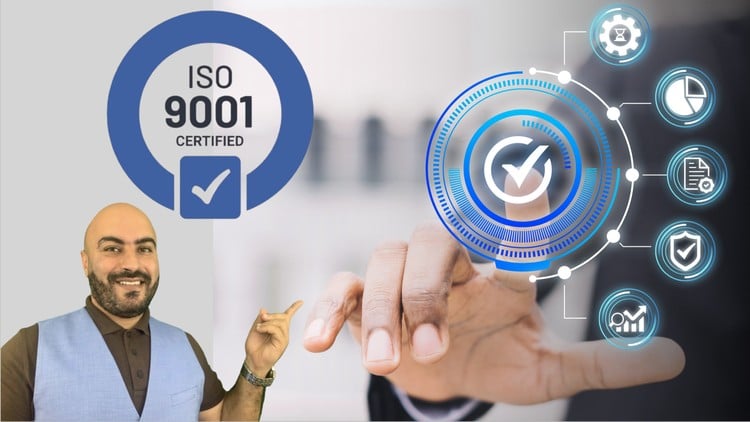
Fast-Track Your Quality Journey and achieve Excellence!
What you will learn
Explain the importance of ISO 9001 in achieving quality management and improving customer satisfaction.
Understand the structure of ISO 9001:2015 and the seven quality management principles it is based on.
Analyze and interpret the key requirements of the ISO 9001 standard and how they apply to an organization.
Learn how to establish, implement, and maintain a QMS in alignment with ISO 9001 requirements.
Use risk-based thinking to identify and address risks and opportunities related to quality management.
Perform a gap analysis to determine what is needed to achieve ISO 9001 certification.
Learn how to create, manage, and maintain the documented information required by ISO 9001.
Acquire skills to plan, conduct, and report on internal audits of the QMS.
Understand the process of obtaining ISO 9001 certification and how to work with certification bodies.
Implement strategies to monitor, measure, and improve the effectiveness of the QMS continuously.
Add-On Information:
Note➛ Make sure your 𝐔𝐝𝐞𝐦𝐲 cart has only this course you're going to enroll it now, Remove all other courses from the 𝐔𝐝𝐞𝐦𝐲 cart before Enrolling!
- Fast-Track Your Quality Journey and achieve Excellence!
- Strategic QMS Integration: Master positioning ISO 9001:2015 as a strategic framework for organizational resilience, competitive advantage, and sustainable growth, not just compliance.
- Cultivating a Quality Culture: Implement advanced techniques to foster genuine quality consciousness and leadership engagement, embedding QMS principles as a core organizational value.
- Advanced Process Optimization: Gain deep insights into streamlining workflows, identifying systemic inefficiencies, and optimizing inter-departmental processes for peak performance and waste reduction.
- Data-Driven Excellence: Develop expertise in transforming QMS data into actionable intelligence, driving smarter decisions and measurable improvements across all functions.
- Proactive Risk & Opportunity Management: Elevate your approach to risk, moving beyond mitigation to proactively identify opportunities and build an agile, future-proof quality system.
- Supply Chain Quality Synergy: Implement robust strategies for integrating and assuring quality throughout your entire external supply chain, building stronger, more reliable partnerships.
- Systemic Non-Conformity Resolution: Apply advanced root cause analysis and corrective action methodologies to permanently eliminate issues and prevent recurrence, fostering continuous learning.
- Dynamic QMS Architecture: Design and evolve a flexible Quality Management System that proactively adapts to market shifts, technological advancements, and your organization’s evolving strategic landscape.
- Sustainable Certification & Beyond: Discover methods for maintaining QMS integrity, leveraging audits as a tool for continuous learning, and fostering a culture of perpetual quality enhancement.
- Unlocking Stakeholder Value: Understand how a meticulously managed QMS directly enhances customer loyalty, strengthens brand reputation, and creates sustained value for all stakeholders.
- Global Best Practices & Benchmarking: Gain a competitive edge by incorporating global quality benchmarks and integrating ISO 9001 as a foundation for industry leadership and differentiation.
- PROS:
- Drives significant operational efficiencies, innovation, and direct bottom-line impact.
- Transforms quality into a strategic business asset, vital for competitive advantage.
- Equips you with leadership skills for effective QMS implementation, management, and continuous improvement.
- Boosts your professional profile with coveted expertise in global quality management standards.
- CONS:
- Requires substantial ongoing organizational commitment and resource allocation for sustained implementation and continuous improvement, which can challenge resource-constrained entities.
English
language